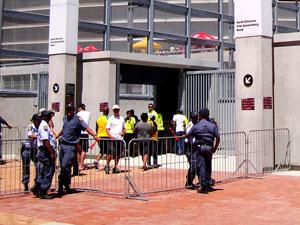South Africa tightens security for the World Cup
(Image by Flickr user warrenski (cc:by-sa))
This story was originally covered by PRI’s “The World.” For more, listen to the audio above.
More than 300,000 fans are expected to visit South Africa in the coming weeks, and some of them are nervous. South Africa has a high rate of violent crime already, and everyone from soccer hooligans to al-Qaeda pose potentials threats to the games.
The biggest risk to visitors is likely going to be street crime, according to Johan Burger of the Institute for Security Studies in Pretoria. Burger, who served in the South African police force for 36 years, believes that it’s important that visitors are aware of the risk of robbery.
Some 44,000 police officials will be out on the streets of South Africa, which may serve as a potent deterrent to crime. And USA Today reports that South Africa will spend $180 million on security preparation, including $89 million on equipment such as helicopters, water cannons, patrol vehicles and body armor. Burger told PRI’s “The World:”
I think all in all, with the forces that will be available, and if people themselves act responsibly, certainly that would reduce the chances of falling victim to crime. In fact, I was one of those, and still am one of those, who believe that South Africa will be a fairly safe place during the soccer World Cup.
Some threats may not enter the country in the first place. BBC reports that local authorities have already deported 10 suspected hooligans from Argentina, accusing them of planning disruptions to the games. And English authorities have held some 3,200 English fans’ passports — saying they were known for disruptive behavior — in an effort to minimize potential threats.
The extra security isn’t enough to reassure every visitor to the country. In fact, many have been turning to private security firms for extra peace of mind. The Mail and Guardian reports that “security firms are making a killing from the world cup,” quoting one private security contractor who said that his revenue and turnover have increased by threefold.
Those private security contractors are bringing their own host of problems, however. BBC spoke with one contractor who said that many are overestimating the threats in South Africa. “It’s not Congo here,” he said. “These guys want Uzi machine guns on every bus and we say: ‘Are you mad? You don’t need heavy weapons here.'” The source also noted that “some local security companies were playing along with foreign misconceptions in order to boost their profits.”
PRI’s “The World” is a one-hour, weekday radio news magazine offering a mix of news, features, interviews, and music from around the globe. “The World” is a co-production of the BBC World Service, PRI and WGBH Boston. More “The World.”
